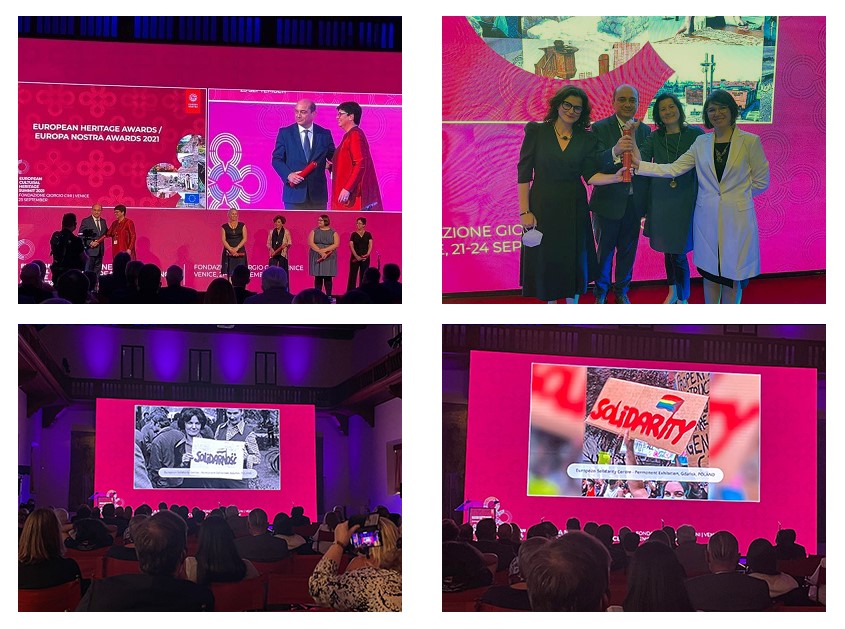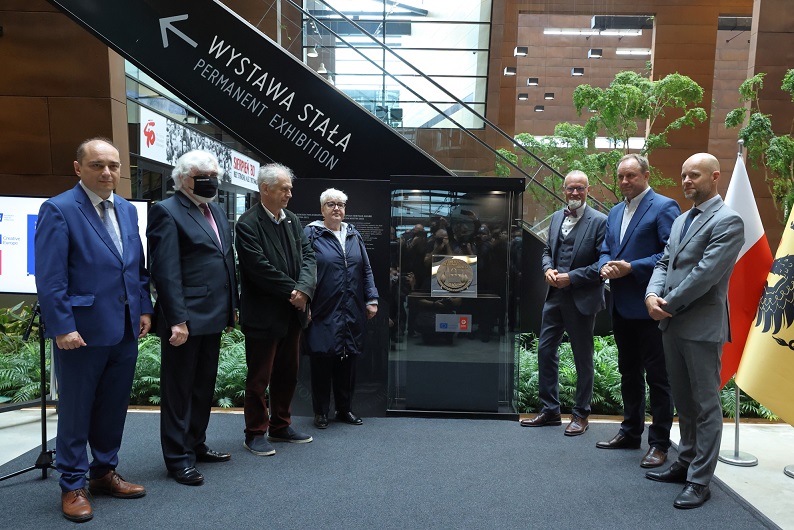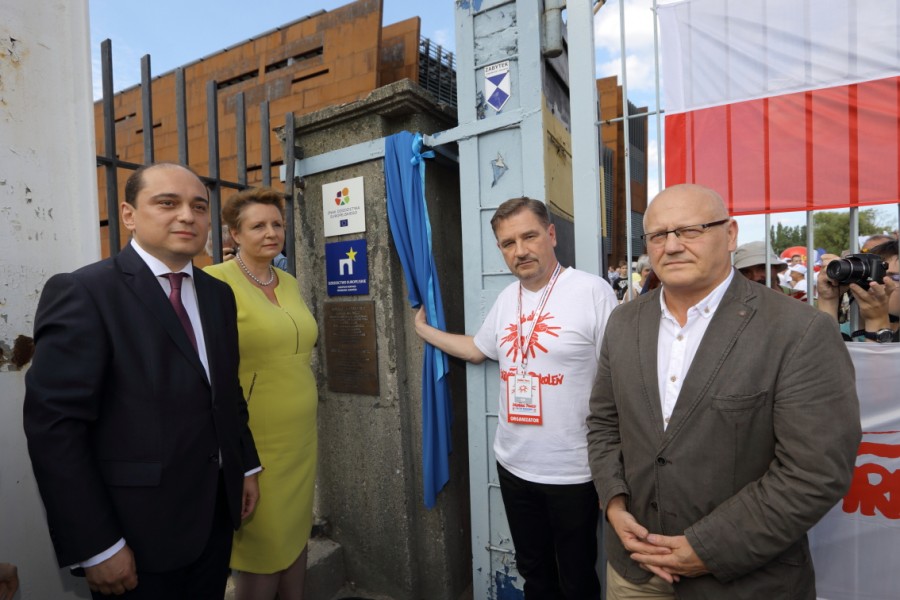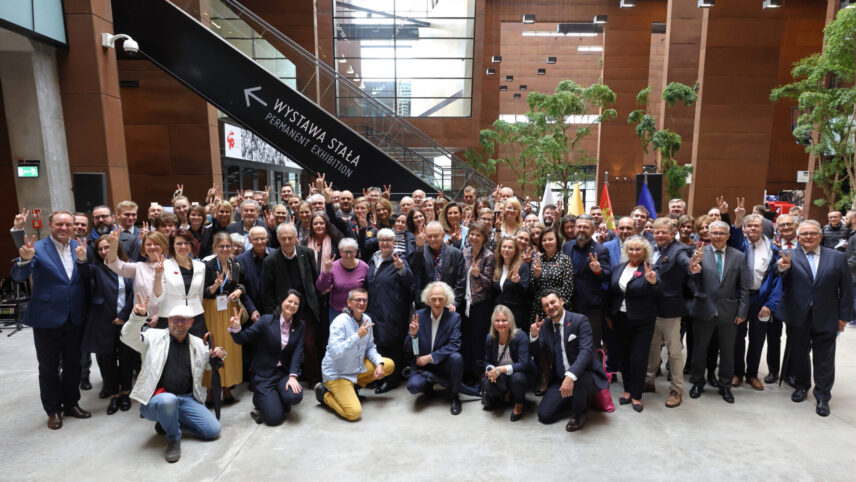The European Heritage Award / Europa Nostra 2021, awarded in May 2021 to the permanent exhibition of the European Solidarity Centre, on 23 September 2021 evening in the form of a certificate was ceremoniously placed in the hands of Basil Kerski, director of the institution. The European Union’s most important distinction in the field of cultural heritage honoured 24 exemplary achievements from 18 European countries this year. The gala took place in the former San Giorgio Monastery on the island of San Giorgio Maggiore in Venice, home of the culturally active Giorgio Cini Foundation.
The announcement of the award winners took place on 25 May. Three months later, on the 41st anniversary of the signing of the Gdansk Agreement, a plaque certifying the award was unveiled in the winter garden of the ECS. And on 23 September, the European Heritage Awards gala took place in Venice. As a reminder, five years ago the ECS was the first and so far only museum in Poland to be honoured with the Council of Europe Museum Award (EMYA). And the historic Gdańsk Shipyard – Solidarity Square with the 1970 Fallen Shipyard Workers Monument, Gate No 2, the BHP Hall and the European Solidarity Centre – was awarded the European Heritage Label.

M. Cristina Vannini presented the European Heritage / Europa Nostra 2021 Award to Basil Kerski, Director of the ECS. Delegation from Gdańsk (from left): Aleksandra Dulkiewicz – President of Gdańsk, Basil Kerski – Director of the ECS, Magdalena Mistat – Deputy Director of the ECS and Magdalena Charkin-Jaszcza – ECS Director’s Plenipotentiary for International Affairs, 23 September 2021
Fot. Archiwum ECS
The experience of being part of a big family
The ECS permanent exhibition is the only Polish winner of the European Heritage Award / Europa Nostra 2021 and was recognised in one of four categories: Education, training and awareness-raising. According to the international jury, the exhibition emphasises the importance of work, promotes activism in the field of human, labour and political rights and civic engagement. It exemplifies “how to preserve stories and make them relevant to the modern world”.
“For us it is a great experience, an experience of being part of a big family. Someone beautifully said that heritage, especially material heritage, is the property of a village, a town, a country, but its beauty, its soul, is the property of us all. Culture knows no boundaries, no ethnic identities, sows no hatred, celebrates human creativity and is a source of defence for those values that lie at the heart of Europe. Today we felt that there is such a thing as the European spirit,” said Basil Kerski, Director of the ECS, after the gala. “Each of today’s awarded projects preserved the human dream of a better life, it is our duty to secure this good and preserve its continuity.”
Aleksandra Dulkiewicz, Mayor of Gdańsk, also present at the ceremony, could not hide her joy. “I am extremely happy with this award, because it is a great honour not only for the ECS, but also for Gdańsk,” she said. “This award confirms what everyone who has ever watched Europeans visiting the permanent exhibition at the ECS knows – it is still an up-to-date, attractive and universal story about how the power of solidarity can change the course of history. It is impossible to count how many people find their own story in this exhibition. The values that gave life to the peaceful Solidarność revolution must remain alive, this is also our task, because Europe is us.
Here we are very much united
On 31 August, a ceremony was held in the ECS winter garden to unveil the commemorative plaque of the EUROPEAN HERITAGE AWARD / EUROPA NOSTRA 2021, which was attended by Dr Uwe Koch, representative of Europa Nostra. He said that the ECS has a unique potential to bring people together and that the permanent exhibition is a place where history becomes tangible and alive.
“I would like to bow to the citizens of Gdańsk who gave us courage,” said Dr Uwe Koch moments before unveiling the Europa Nostra plaque. “Solidarity is the key to a united Europe. In my heart I feel that we are very much united in this place.”
The European Heritage Awards / Europa Nostra is a project set up in 2002 by the European Commission. It is carried out by Europa Nostra, a federation of heritage NGOs active for 58 years and covering 40 countries, with the support of a network of public institutions, companies and individuals. The Awards highlight and promote the role of heritage and best practices in the field, encourage the international exchange of knowledge and bring together in networks all those interested in heritage. There are significant benefits for the winners of the awards – increased national and international promotion, further funding and increased visitor numbers. Among all European citizens, the Awards scheme is a way to raise awareness and care for our common heritage. The Prize is supported by the EU’s Creative Europe programme, which targets the cultural and creative sectors.

Moments after the plaque unveiling ceremony in the ECS winter garden, from left: Basil Kerski – ECS director; Andrzej Nawrocki – former Gdańsk Shipyard worker, participant in the 1980 August strike and guide to the ECS permanent exhibition; Bogdan Lis – former oppositionist, ECS Council member; Henryka Krzywonos – signatory of the Gdańsk Agreement; Dr Uwe Koch – Europa Nostra representative; Mieczysław Struk – marshal of the Pomorskie Voivodeship and Alan Aleksandrowicz – deputy mayor of Gdańsk, 31 August 2021.
Fot. Grzegorz Mehring / Archiwum ECS
The heart of the ECS
The European Solidarity Centre is based on the site of the former Gdańsk Shipyard, where the Solidarność revolution was born in August ’80. The institution nurtures the memory of this largest peaceful social movement in post-war Europe. At the heart of the ECS is a permanent exhibition telling the story of Poland’s road to freedom and documenting the changes that took place in Central and Eastern Europe under its influence. It defines and inspires all cultural, educational and scientific activities undertaken by the ECS.
The permanent exhibition of the ECS occupies almost 3,000 square metres on the 1st and 2nd floors of the building. It is divided into seven halls. Visitors spend an average of 2 hours here. This modern exhibition – equipped with over 1,800 exhibits – is narrative in nature. The visitor is immersed in a story told through archival objects, documents, manuscripts, photographs and video projections, interactive installations…. Everyone who visits this exhibition has the chance to find their own references to history and the present. The multiplicity of narratives makes it possible to return here again and again, finding a new story each time.
The creation of the exhibition was an interdisciplinary effort by historians, social scientists, museum experts, designers and engineers. Materials were obtained from nearly 60 museums, archives, local historians and former opposition figures from across Central and Eastern Europe, including Bulgaria, the Czech Republic, Estonia, Lithuania, Latvia, Russia, Romania, Slovakia, Ukraine and Hungary. These activities have enriched and strengthened the international reach of the exhibition.
Since the opening of the new building in 2014, the ECS has welcomed 5 million visitors and more than 1.1 million have visited the permanent exhibition.

ECS team and friends, 31 August 2021
Fot. Grzegorz Mehring / Archiwum ECS
“The European Solidarity Centre is a unique cultural entity and an important social actor. It is not only an institution, it is a broad community, and perhaps even a social movement and a kind of ideological formation,” said Professor Cezary Obracht-Prondzyński in his laudation. “The ECS is there so that each of these 4 million visitors and the millions more who will come will leave with a small piece of knowledge about the former Solidarity, but at the same time so that they leave with a piece of that small solidarity in their hearts.”
The Gdańsk City Council honoured the European Solidarity Centre with the St Adalbert Medal. The award was received on 28 October 2019, during a ceremonial session of the City Council in Artus Court.
The Council established the medals in 1996. They are awarded to individuals and institutions for outstanding services to Gdańsk and for activities that have contributed to making the city famous nationally and internationally. The St Adalbert Medal also recognises work for cooperation and reconciliation between nations, as well as projects promoting tolerance and dialogue between representatives of different faiths and religions. To date, 79 medals have been awarded.
In 2019, the St Adalbert Medals were awarded to:
– Prof. Grażyna Świątecka, cardiologist and social activist, founder and long-standing manager of the Gdańsk Helpline “Anonymous Friend” – the first in Poland, founded in 1967, together with Prof. Tadeusz Kielanowski
– Andrea Anastasi – sportsman, coach of the volleyball team Trefl Gdańsk (2014-2019), with which he won the Polish Vice-Championship (2015), Polish Cup (2015, 2018), Polish Super Cup (2016) and the bronze medal of the Polish Championship (2018)
– European Solidarity Centre.
Mestvin II, Duke of Pomerania Medal was awarded posthumously to Paweł Adamowicz – Mayor of the City of Gdańsk (1998-2019), thanks to whom Gdańsk fully became a city of freedom and solidarity.
The laudation in honour of the European Solidarity Centre was written and delivered by Professor Cezary Obracht-Prondzyński, academic lecturer, President of the Kashubian Institute and member of the ECS Historical and Programme College.
“The European Solidarity Centre came into being out of the memory of many people of this extraordinary event, which left its mark on the lives of an entire generation, which was August 1980 and the phenomenon of Solidarity. It was also born out of Paweł Adamowicz’s dream that Solidarity and its ideals would be passed on to future generations,” said the professor. “And also from the hope that this unique experience and heritage of the Polish people will prove important and inspiring for contemporaries. Not only in the country and not only in Europe. Finally, it was born out of the desire that people with different beliefs, experiences and ideological views could participate in this institution.”
“The European Solidarity Centre is not just employees, it is not a cultural institution on paper, but the result of the interaction of people. You all are the ECS,” stressed Basil Kerski, director of the ECS, who symbolically accepted the medal, pointing to those gathered in Artus Court. “Today’s celebration is special for us, and I still remember the difficult discussions around the ECS. This idea that it should come into being was crazy, there was no such institution before. We can see today that the Centre’s activity is not only a reflection on August and the Polish road to freedom. This space is open, and its originator, Paweł Adamowicz, knew that the ECS could not just be a story about Gdańsk, but must be a story about the world. Then we will have many friends. That is the strong part of the ECS.”
THIS IS A GREAT HONOUR FOR ECS! THANK YOU!
Never before in the 40-year history of the MUSEUM AWARD of the Council of Europe has it been awarded to an institution from Poland. In 2016, this award went to the European Solidarity Centre in Gdańsk. According to the jury, the ECS is “a fascinating example of a cultural institution working to promote freedom and solidarity”, while the events it refers to and the institution’s programme “make it a forum for contemporary Europe”.
The COUNCIL OF EUROPE MUSEUM AWARD has been awarded since 1977. The Council of Europe, the oldest European institution, honours institutions whose activities are particularly important for the heritage and identity of our continent.
Lots of competition
There was a lot of competition and a multi-stage selection process, including a mysterious juror visiting the ECS in December 2015, who subjected the venue to a meticulous evaluation: from the quality of the exhibition, to the qualities and functionality of the building, to the visitor service, to the projects carried out here. The verdict was a great joy for us; according to the jury, the ECS managed to “create from the history of the Solidarity trade union a strong and moving source of inspiration for civic activity and engagement”. And this place “connects history with everyday life, creating a bridge between culture and democracy”. This is all the more important because, as the jury noted, “twenty-five years after the fall of the Berlin Wall, thoughts and attitudes are beginning to erect new walls”.
Mirosława
The fact that the ECS was honoured with the prestigious MUSEUM AWARD OF THE COUNCIL OF EUROPE was confirmed by the diploma and statue of ‘Woman with a Beautiful Bust’ (1969), by Joan Miró (1893-1983), which lived for a whole year in the winter garden of the ECS. She was visited by distinguished guests, we told visitors about her, children prepared artistic representations of her….
‘Woman with a Beautiful Bust’ at the ECS was given the old Polish name Mirosława, in the caressing diminutive Mirka, which not only refers to the creator’s name, but also proclaims the two values that made up its sound: miro (peace, tranquillity, goodness) and fame.
How is it that it is the work of the Catalan artist Joan Miró that is in evidence in the laurels of the MUNICIPAL AWARD OF EUROPE? The answer is simple – the Joan Miró Foundation, the Museum of Contemporary Art in Barcelona, was the first institution in history to receive the MUNICH AWARD of the Council of Europe in 1977.
Farewell
It was with regret on 21 April 2017 that we bid farewell to Mirka at the ECS, sending her on her way to become the next winner of the MUNICIPAL AWARD OF THE COUNCIL OF EUROPE. On 26 April in Strasbourg, the statuette was taken over from us by the Memorial Centre for Human Trafficking and Slavery (Memorial ACTe), which is based in Guadeloupe, an overseas department of France in Central America.
The title of winner of the 2016 EUROPE COUNCIL MUSEUM AWARD will remain in the portfolio of the European Solidarity Centre for all time.
The historic complex of Gdańsk Shipyard buildings – the BHP Hall, Gate No. 2, Solidarity Square with the monument to the Fallen Shipyard Workers of 1970 – and the European Solidarity Centre, which carry out extensive educational activities and promote the heritage of Solidarity, have been awarded the European Heritage Label. The label is awarded to sites of particular importance to European history and culture, connected to the idea of unification and to democratic and humanist values of supranational importance.
The European Heritage Label for the historic Gdansk Shipyard complex was applied for by the European Solidarity Centre already in 2013. The role of the label is to create opportunities for acquiring and expanding knowledge about the common cultural heritage, as well as to influence the understanding of democratic values and human rights. This is why the European Solidarity Centre was awarded the ZDE along with the historical sites. This is because the ECS carries out extensive educational activities and promotes the heritage of Solidarity in Poland and in international circles. The BHP Hall, Gate No. 2, Solidarity Square with the monument to the Fallen Shipyard Workers of 1970 and the wall with inscription plaques are not only places of momentous historical events with international implications, where the democratic changes in Europe after 1989 were initiated. They are places where, in an atmosphere of dialogue, an open civil society, one of the foundations of contemporary Europe, was peacefully shaped.

The unveiling of the Sign plaque on the historic Gate No. 2 of the Lenin Gdańsk Shipyard took place on 29 August 2015. From left, Basil Kerski, Director of the ECS, Prof. Małgorzata Omilanowska, Minister of Culture and National Heritage, Piotr Duda, Chairman of the National Commission of the Solidarity Trade Union, Wiesław Bielawski, Deputy Mayor of the City of Gdańsk.
fot. Grzegorz Mehring / ECS
The EHL was awarded for the first time in 2013, but the idea of honouring sites of European heritage in this way began to develop much earlier, in 2006. In 2014, in addition to the team associated with the Gdańsk Shipyard, sixteen other sites were honoured, including two Polish landmarks on the map of European history: the Constitution of 3 May and the Union of Lublin. Thirty-six sites from 18 countries competed for the award.
The European Heritage Label was awarded to the historic complex of Gdańsk Shipyard facilities and the ECS – on 19 December 2014. The ceremonial presentation of the plaque took place on 15 April 2015 in Brussels. And on 29 August 2015, the plaques were unveiled with honours in Gdańsk.
